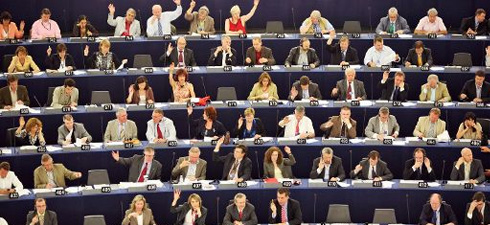When the new parliament is inaugurated on 14 July, the traditional EPP and PES grand coalition may be laid to rest, and its demise will likely be accompanied by an end to long-standing cross-party deals on economic directives and the appointment of commissioners. It would be unwise to under-estimate the potential for change in a Parliament which has in the past provided the venue for some highly innovative political experiments. It could even be argued that it was the alliance between the European Peoples’ Party and the socialists in Strasbourg that provided the inspiration for the German CDU-SPD grand coalition.
Notwithstanding the relatively disappointing performance of Silvio Berlusconi’s People of Freedom party in Italy, the victory of the EPP has confirmed the rise of the centre-right in Europe, and social policies will certainly change as a result. The decline of the PSE and the extreme left will put an end to the secular majority formed by the socialists along with the ALDE (liberals), Greens and the GUE (left), to marginalize the Christian Democrats of the EPP on the occasion of votes on ethical issues such as homosexual union, or the use of stem cells. But the EPP, which is still 100 votes short of an absolute majority of 369 seats out of 736, will not have complete control.
Another major development may be the interruption of a cosy arrangement between the EPP and the PES, which effectively means that the presidency of the EU parliament is passed from one party to the other in the course of every mandate. Socialist Martin Schulz, along with Polish and Italian conservatives Jerzy Buzek and Mario Mauro, were the candidates in line for this exchange of roles. But ALDE leader, Britain’s Graham Watson, has now entered the race for the presidency, arguing that the election results should encourage the PPE to be “imaginative."
Watson has also suggested that the promise of a broad front to re-elect Barroso may be enough to secure EPP support for an ALDE-EPP dominated coalition to include the nationalists of the UEN or the Greens and the appointment of a liberal President of the European Parliament. But Daniel Cohn Bendit’s party, which scored a resounding victory at the polls, is strongly opposed to a renewed mandate for Barroso, who is also unpopular with the parliament’s socialists. The British Conservatives led by David Cameron constitute a strong block and are seeking to build new alliances that would enable the Conservatives to recover votes lost to the British Eurosceptic parties UKIP and the extreme right newcomer BNP. As always, MEPs who are not aligned with a group or list will have virtually no role in the life of the parliament.
Was this article useful? If so we are delighted!
It is freely available because we believe that the right to free and independent information is essential for democracy. But this right is not guaranteed forever, and independence comes at a cost. We need your support in order to continue publishing independent, multilingual news for all Europeans.
Discover our subscription offers and their exclusive benefits and become a member of our community now!












